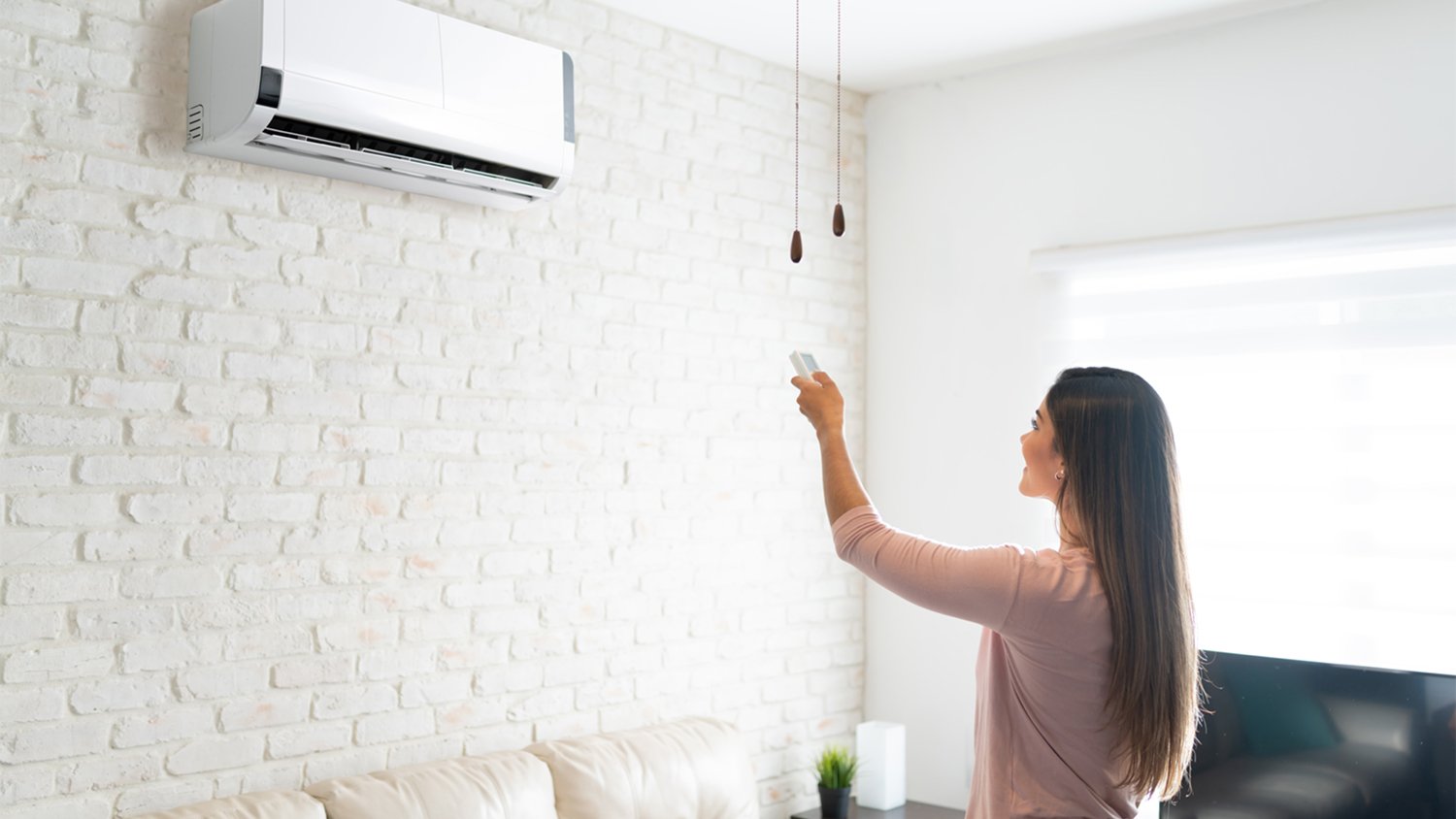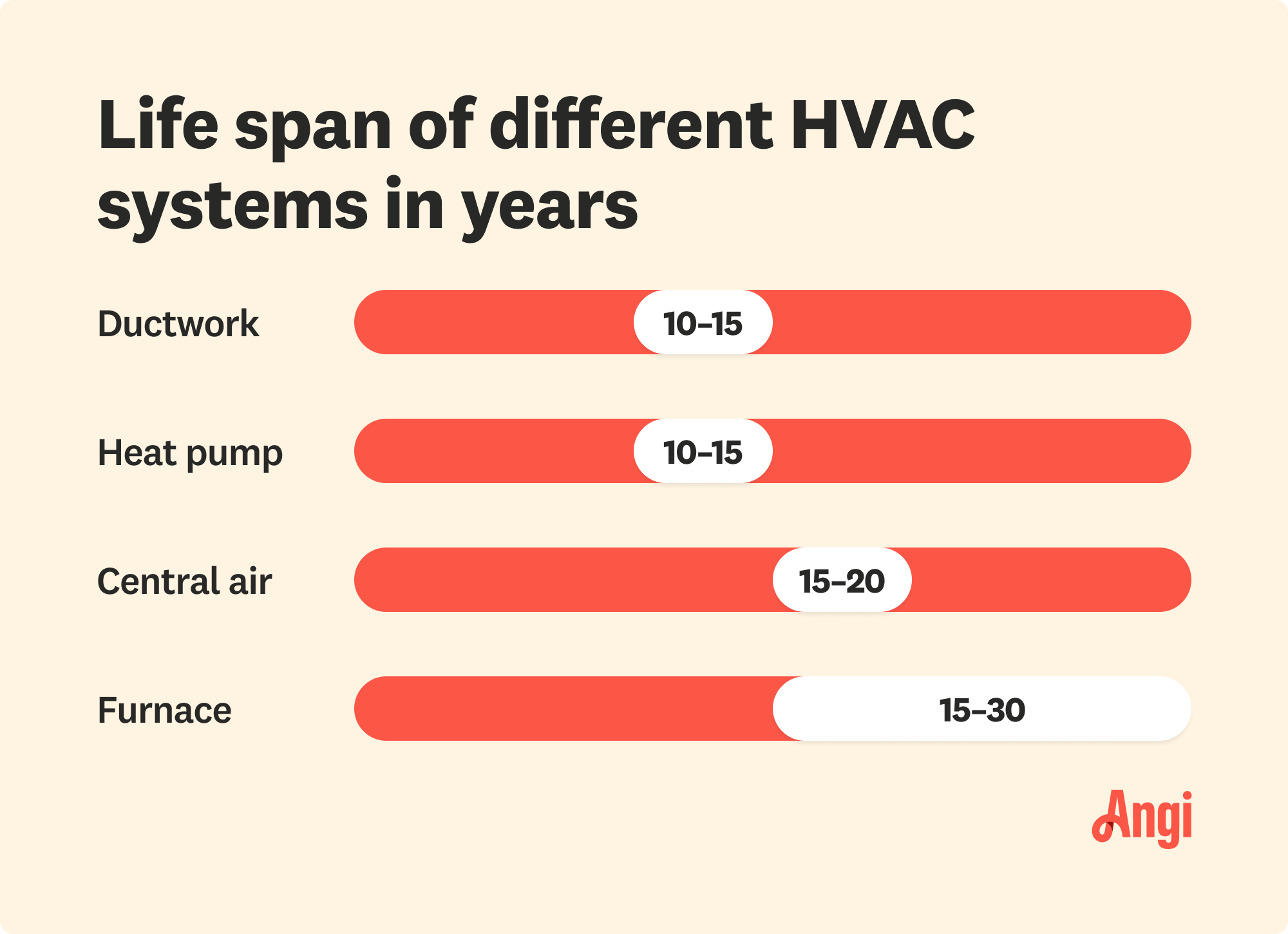
The average boiler installation cost depends on size, system type, and other factors. Keep reading to learn the cost of a new boiler in New York City.
Make your HVAC decision a breeze


Home Value Rating: 2/5
Installing a new HVAC system can add some value with a pro’s expertise and make your home more appealing to potential buyers.
A new HVAC can raise your home’s value by 5% to 7%.
Benefits of a new HVAC unit include energy efficiency, tax benefits, and a higher home appraisal.
A new HVAC unit costs anywhere from $5,000 to $10,000.
If you’re on the fence about replacing your home’s heating and cooling system, you’re likely wondering whether installing a new HVAC system will increase your home value. If you live in an older home or your current HVAC system is on the outs, a new system can help heat and cool your home more efficiently and boost your home’s value. Let’s review how a new HVAC system affects your home’s value, and when to hire an AC installer to get started.
Yes, installing a new HVAC system can increase your home value by 5% to 7% with a return on investment (ROI) of about 30%. This projected increase is especially true if you replace your current setup with an energy-efficient system, providing additional benefits to future buyers in the long run. Potential home buyers will view a new system as a money saver on electricity bills and lower maintenance costs for at least 10 to 15 years. Consult a local AC installer about the best time to replace your HVAC system before selling your home.
The ROI of your HVAC system depends on several factors, such as the type of HVAC you install and its energy efficiency. Here are the different factors that determine your HVAC's impact on home value.
In hot climates, you’ll see significant resale value in installing an efficient air conditioning unit, helping you and future owners save on energy costs. In colder regions, upgrading your heat pump or furnace will reap better ROI. Not only will these upgrades increase your home’s value, but they’ll also make the home more comfortable and appealing to buyers.
The higher the SEER rating on your HVAC systems, the more energy efficient they are (and the lower your energy bills). A good SEER rating for an air conditioner is 15 to 16, and a good SEER rating for a furnace is 15 to 20. These higher ratings mean lower ongoing operating costs, increasing your home value to buyers.
Smart thermostats also increase your HVAC’s energy efficiency—and ROI—by offering zoning capabilities and scheduled settings to maximize energy savings.
More and more homeowners are concerned and invested in reducing their carbon footprint. A more up-to-date and energy-efficient HVAC system appeals more to buyers who care about sustainability.
Because HVAC systems range in type and function, the ROI depends on the type of HVAC system you install.
| HVAC Type | Average Boost to Home Value |
|---|---|
| Heat pumps | $1,260–$2,280 |
| Central air conditioning | $1,170–$2,370 |
| Geothermal systems | $1,300–$7,300 |
| Ductless mini-splits | $600–$4,350 |
For an HVAC system to reap its full ROI—or any ROI at all—it must be installed by a qualified local HVAC installer. Improper installation can lead to poor performance, inefficient heating and cooling, and more frequent repairs. A licensed tech ensures proper sizing, ductwork design, installation, and overall performance.
Not to mention, installing an HVAC system is not a DIY project because it poses a huge safety risk. Improper electrical wiring and handling of refrigerant can be hazardous. Some manufacturers even void warranties if a licensed professional doesn’t install and repair the HVAC system.

A new HVAC system will boost your home’s appeal and value to potential buyers in a few important ways.
New HVAC systems are more energy-efficient than older models, leading to major savings on your monthly energy bills. Reduced costs over time equal more money in your (or future homeowners’) pockets for other home improvements. Plus, potential home buyers may appreciate that your HVAC system has a lesser environmental impact than older, outdated models.
Investing in a new HVAC system means extra rebates, plus potential tax deductions of up to 10% of the installed costs. While potential home buyers won’t get to share in the rebate payments, you can appreciate the tax benefit that can offset the cost of installing a new HVAC system.
When selling your house, a home appraisal by a professional determines what your home is worth and what potential buyers should pay for it. A professional home appraiser will likely consider your property worth more if its systems are updated with the newest appliances, such as a new HVAC unit. Since HVAC units are big-ticket investments, appraisers will highlight a recent installation in their appraisal.
The ROI on an HVAC system investment depends on how much value it adds and how much you paid for it. For example, if you spent $10,000 on HVAC upgrades before selling your home, and it adds about $2,500 to $3,000 to the sale price of your home, your ROI will be 25 to 30%. You are less likely to see a full return on your investment right away unless it’s a seller’s market, and demand for your home drives the price and value of a new HVAC up significantly.

A new HVAC system costs anywhere from $5,000 to $12,500, depending on where you live, its size and age, and the brand. The type of HVAC system will also impact the cost, from duct-free to hybrid. The average price for a new system is $7,000 for materials and $1,500 for labor. There may be additional costs for additional tasks, including adding zones, installing a new thermostat, and including humidity controls.

Since most HVAC systems last about 10 to 30 years, older appliances will start to break down over time. Here are some signs to watch out for that may indicate you need a new HVAC system:
Heating:
Uneven heating
Decreased efficiency
Pilot light comes on
Evidence of rust, corrosion, or cracks
Higher levels of carbon monoxide
Cooling:
Refrigerant leaks
Inconsistent cooling
High humidity levels
Requires frequent repairs
Hissing sounds
Higher energy bills
One or more of the signs listed above could mean it’s time to look into purchasing a new HVAC system. If you’re unsure which type to buy, you can hire an air conditioner installer near you to inspect your current system and recommend a replacement.
Home is the most important place on earth, which is why Angi has helped more than 150 million homeowners transform their houses into homes they adore. To help homeowners maximize the value of their investments, we gather ROI data from reputable sources, including industry reports, real estate studies, and interviews with market experts. We calculate the average resale value for projects by multiplying the ROI against the project’s average cost according to our cost data, which is sourced from thousands of real Angi customers.
Want to help us improve our data? Send us a recent project quote or home appraisal value to [email protected]. Quotes and personal information will not be shared publicly.
CLR were professional, knowledgeable, clean, and efficient. Very smooth communication and easy to work with. Paul is a true professional; hung a few TVs for me and installed my Lutron system. Highly recommend, will hire again!
Mayflower was an excellent choice for the complete renovation of my condominium. They knew exactly how to deal with the complexities of the condo building and management to make the project very smooth, easy and done right. From start to finish, everyone was incredibly helpful and their...
Tony was very professional and personable. He explained the damage he saw and reassured me the work to be performed. On the day of the visit he was punctual, courteous and exceeded my expectations while sharing information.
Exceptional quality of work, customer satisfaction oriented. I wanted to do interior work and was so impressed I asked for shingle roof and siding work on my home also, which came out very great. Any questions and concerns, Galaxy contractor answered my questions. Thank you guys.
Alex and his crew are great! I contracted them to move my dad and they went above and beyond!
All Complete Construction is very professional and helpful roof company. They care about what they do and provide excellent customer service. Sam is the great person. Their office staff was super positive, helpful and attentive. Wouldn t hesitate to call them again when we need roof chimney...
Excellent sales staff and installer. Easy to work with. I appreciated that my current system was able to be activated and used.
I needed a kitchen and bathroom remodeling and these guys were the best people I could choose. They took my vision and brought it to life! Amazing customer service.
From average costs to expert advice, get all the answers you need to get your job done.

The average boiler installation cost depends on size, system type, and other factors. Keep reading to learn the cost of a new boiler in New York City.

Discover the factors influencing air duct replacement cost in New York City. Learn how to save money and make an informed decision for your home's comfort.

You’ll spend an average of $5,466 on new furnace costs in New York, New York, but your final price depends on a number of factors. Here’s what to expect.

Save energy and prolong the life of your heating pump with proper maintenance and preventative care. An annual service will keep things running smoothly.

If you’re having issues with your heating and cooling system, it’s probably time to discuss these heat pump questions with your HVAC pro.

A whole-house humidifier costs between $400 and $800, but can have an ROI of 40%. Learn if adding this HVAC appliance is worth it for you.